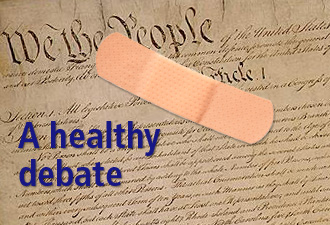Commentary

Who the Health Cares About the Constitution?
Constitutional questions have dogged the health care bill since its introduction. But rather than address these issues head on, supporters of the legislation have shrugged them off. Speaker Nancy Pelosi, when asked where the Constitution grants the power to impose an individual mandate to buy insurance, famously replied, “Are you serious?”
This is the same tactic being used by defenders of the federal takeover of health care in response to the lawsuit against the new law. Pennsylvania Attorney General Tom Corbett, after announcing that he would join twelve other state attorneys general in a class action suit challenging the constitutionality of the law, has been attacked by Gov. Ed Rendell, state House and Senate Democrats, and newspapers across Pennsylvania.
The most troubling attack came from State Representative Dwight Evans (D-Philadelphia), who serves as chairman of the Pennsylvania House Appropriations Committee. Evans threatened to cut off all funding for the Attorney General’s office if he persists in challenging the federal health care legislation.
This threat represents a clear violation of the separation of powers, and undermines the independence of the Attorney General. Indeed, it seems particularly suspicious coming a mere two days after Corbett secured a conviction against Evans’ former House colleague, Mike Veon, and is continuing his investigation and prosecution of lawmakers involved in “Bonusgate.”
Gov. Rendell – after initially suggesting that the attorneys general listen to “any lawyer worth their salt” (implying they weren’t) – took a more tactful approach. Admitting that the Attorney General has sole discretion, and the duty, to enter into litigation to defend the rights of Pennsylvania citizens, Rendell requested he drop the suit, citing the costs of legal action and the boundless benefits of health care reform to Pennsylvanians.
Rendell’s concern over the use of taxpayer money for the lawsuit represents the zenith of hypocrisy. There was no outrage when President Obama and Gov. Rendell used taxpayer funds on their public relations blitz touting the health care legislation. Gov. Rendell and Rep. Evans didn’t object to House Democrats’ suit, on behalf of the trial lawyers, to overturn a tort reform law on procedural grounds. Nor was there any objection to the use of taxpayer-funded lawyers to defend the criminal activity of legislators and staff. Indeed, the entire health care bill itself represents a trillion-dollar effort to pander for votes.
Furthermore, Rendell and others grossly overstate the law’s benefits. Even by the Obama administration’s estimates, only a fraction of the uninsured will be covered, despite nearly a trillion dollars in subsidies to insurance companies and a myriad of new taxes to pay for them. Mandates like “guaranteed issue” and “community rating” increase the cost of insurance, as evidenced by “reform” in states like New York. An individual mandate to buy insurance will, as Massachusetts has demonstrated, also results in skyrocketing premiums-which is why candidate Obama opposed such a mandate. In fact, the CBO predicted insurance costs would increase by 10-13% under the new law.
Rendell clearly wants more federal funding to spend, but seems to forget that Pennsylvania residents will be on the hook for higher federal taxes. Between new mandates, federal spending, and increased Medicaid eligibility imposed on the states, Pennsylvania residents will pay an estimated $4,453 per person in higher health care costs, while experiencing slower economic growth.
But all of these arguments about the merits of the legislation or the cost of litigation are moot if the law doesn’t make constitutional muster. The primary premise of those criticizing Corbett and his fellow attorneys general is that the constitutional questions should be ignored because health care “reform” is good. But it is this notion of unlimited government our founding fathers so feared. The Constitution explicitly limits the powers of government-even to prevent well-intentioned laws-to protect the rights of citizens.
The most important duty Attorney General Corbett has is to protect Pennsylvanians from impingement upon their constitutional rights. For him to neglect that duty would be a gross dereliction.
# # #
Nathan A. Benefield is Director of Policy Research with the Commonwealth Foundation (www.CommonwealthFoundation.org), an independent, nonprofit public policy research and educational institute based in Harrisburg.